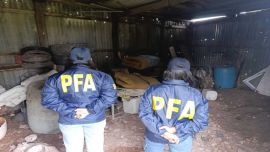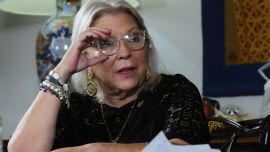At least 16 multinational companies have left Argentina so far under President Javier Milei’s government. The sectors vary, but in nearly all cases they are affected by a lack of legal security, profitability, difficulties in collecting dividends and a firm’s regional strategy. A whole set of structural reasons which have averted the official slogan, improving conditions to entice investment into the country.
Mass consumption, energy, telecom firms and banks are among the most affected sectors. Many of these decisions to divest are part of lengthy processes – they can take from six months to two years. And in several cases, they were started before the change of government, although they have been completed during the current administration.
There are many reasons, though the most commonly cited one is instability.
“Argentina has been consistently breaching contracts for 30 years. Most groups are in a process of regional reconversion and when they look at Latin American countries, the first country they leave is Argentina, because it’s where they’ve had more wounds inflicted,” Dante Sica, an economist and founder of ABECEB consultancy firm, told Perfil.
Sica, who served as production minister in former president Mauricio Macri’s government, said that “many companies did not leave before due to the impossibility of setting a price in an ‘unanchored’ economy.”
“Part of this stabilisation process is that firms set a value, and nationwide companies repurchase these assets and bring the money from abroad or get financing,” he added.
Profitability is another factor.
“Measured in dollars, there are leading countries such as the United States or others in Europe which provide more than 10 percent of profitability; so, if Argentina provides three percent, we can consider it low – five percent is a medium-high average,” said Federico Carrera, co-founder of High Flow, a consultancy firm specialising in executive talent, in an interview.,
On the positive side, multinationals usually obtain additional benefits from their presence in Argentina since they acquire critical capabilities to replicate in the region and manage other countries, due to the skills of Argentine executives, said the analyst.
“Yet when the fiscal impact is great, efforts to understand inflation worsen and the business risks of the value chain increase, the companies understand that the cost-benefit equation is no longer positive,” Carrera pointed out.
The reduction of the foreign exchange gap between the official dollar exchange rate and financial exchange rates, such as ‘CCL,’ made it cheaper in 2025 for multinationals to convert their “trapped” pesos into dollars and finally get out.
“Not being able to dispose of revenue is something any investor sees as negative,” Carrera agreed.
Carrefour, Makro and Burger King: Exit of mass consumer giants
As purchasing power has fallen, several consumer companies put up a “for sale” sign.
The most talked about case is French supermarket giant Carrefour, which last month reached a decisive stage. By the end of the year, operations might close. Business leaders Alfredo Coto and Francisco de Narváez are among the interested parties.
Worldwide, Carrefour is reorganising its operations to concentrate on its most profitable and stable markets, mainly in Europe (predominantly France and Spain). Its Argentine subsidiary, despite a large volume of sales and presence (more than 680 shops and 17,000 employees), has not achieved the profitability levels expected by the parent company in recent years.
Makro, the Dutch wholesaler, left last January. That decision was part of a strategic regional withdrawal. Chilean group Cencosud – owner of the Jumbo, Disco and Vea supermarkets– purchased 100 percent of its operations for US$122.5 million. Negotiations had started in 2024, and the operation marked the retreat of SHV Holdings from the country after more than three decades; in turn, it meant the entry of Cencosud into the wholesale cash & carry segment in Argentina.
The sale of restaurant chain Burger King’s operations in Argentina is taking giant strides and could be defined over the next week. The process, which started in late September when Mexican group Alsea put up its 116 restaurants for sale, was accelerated in early October with the emergence of an unexpected candidate, Grupo Desembarco. The Argentine food firm officially confirmed it is in “last stages of negotiations” after presenting a letter of intent accepted by Alsea to move forward with talks.
HSBC’s goodbye, empowering Galicia
The exit of HSBC was made official in April 2024, when a sale agreement to Grupo Financiero Galicia for US$550 million was first announced. The operation received the final approval of the Central Bank on September 12, 2024 and was finalised in December, 2024, when branches were renamed “Galicia Más.”
HSBC’s explanation was clear and was aligned with its global strategy: the sale allowed the company to focus its resources and capital on “opportunities with a higher value” within its international network, mainly in the Asian market. In other words, the Argentine subsidiary used far too many resources, doubting profitability given a context of high volatility.
Galicia added between 600,000 and 700,000 new clients from HSBC’s portfolio and has consolidated itself as the biggest private bank in Argentina.
‘Argentinised’ Vaca Muerta
Vaca Muerta was strongly “Argentinised” this year and last, with the exit of multinational giants often replaced by local operators.
The most resounding divestiture was that of ExxonMobil, which in late October 2024 sold all its strategic shale oil assets to the Argentine company Pluspetrol, in an operation valued at nearly US$1.7 billion, just a few months before Milei took office.
A few months later, in April 2025, Malaysian state oil company Petronas followed suit, selling its key share in the “premium” La Amarga Chica block to Vista Energy, the company founded by ex-YPF boss Miguel Galuccio, for approximately US$1.2 billion.
The trend was followed by French company TotalEnergies, though without a complete exit. It refocused its strategy by selling its main oil assets in Vaca Muerta to state firm YPF in August 2025, to concentrate on gas operations.
The reasons behind these exits are less about the local situation and more about strategic global decisions by parent companies, which seek to reallocate capital to lower risk or higher profitability projects in other regions, making use of local firms’ interest to consolidate their position in the non-conventional formation.
Other sell-offs
Spanish company Telefónica sold 100 percent of its subsidiary Movistar Argentina to Telecom in an operation finalised in March 2025, following its global strategy to reduce exposure in Hispanic America.
Other firms also changed their business model, such as Procter & Gamble (P&G) and Clorox, which sold their plants and licensed their main brands (such as Ariel, Ayudín, Poett) to local operators, without entirely leaving the country.
In the insurance sector, US company Prudential sold its local operations to Grupo Werthein in 2024. In healthcare, Brazilian group Dasa divested itself of the Diagnóstico Maipú laboratory network, by selling it to local group Swiss Medical in October 2025.



















Comments